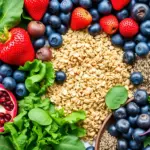Are you aware that consuming an adequate amount of fiber is essential for maintaining optimal health? Fiber, which consists of two main types—soluble and insoluble—plays a crucial role in a balanced diet, aiding in digestion and promoting overall well-being. In this article, we will explore the various benefits of incorporating fiber into your daily meals, such as improving digestive health, supporting weight management, enhancing heart health, and even reducing the risk of chronic diseases. Keep reading to discover why you need fiber in your diet and how it can significantly impact your health.
Digestive Health
Improves Bowel Regularity:
Fiber plays a crucial role in aiding digestion by adding bulk to stool and promoting regular bowel movements. Soluble fiber absorbs water and forms a gel-like substance, which softens the stool, while insoluble fiber adds bulk and helps it move through the digestive tract. This combination helps prevent constipation and encourages a healthier gut.
Examples of Fiber-Rich Foods:
- Whole grains (oats, brown rice)
- Fruits (apples, berries, pears)
- Vegetables (broccoli, carrots, Brussels sprouts)
- Legumes (beans, lentils, chickpeas)
Prevents Digestive Disorders:
Increased fiber intake is linked to a lower risk of several digestive disorders. A high-fiber diet can help prevent conditions such as hemorrhoids, which occur when the veins in the rectum become swollen, and diverticulitis, which is characterized by inflammation in the intestines. By ensuring regular bowel movements and fostering a healthy digestive environment, fiber plays an essential role in maintaining digestive health.
Weight Management
Increases Satiety
Fiber plays a crucial role in increasing feelings of fullness, which can help with weight management. Foods high in fiber take longer to chew and digest, keeping you satisfied for a longer period. This can lead to reduced cravings and help control hunger levels. For instance, including fiber-rich foods like fruits, vegetables, and whole grains in your meals can significantly enhance your satiety, making it easier to stick to your dietary goals.
Reduced Caloric Intake
Fiber-rich foods typically have a lower caloric density, meaning they provide fewer calories while still offering volume. This makes them an excellent choice for weight loss, as you can eat satisfying portions without consuming excess calories. Studies show that people who eat a diet high in fiber tend to have reduced overall caloric intake, leading to more effective weight management. Incorporating foods such as legumes, nuts, and seeds can help achieve this balance and support a healthier weight.
Heart Health
Lowers Cholesterol Levels
One of the significant benefits of consuming fiber is its ability to lower LDL (low-density lipoprotein) cholesterol levels. Soluble fiber binds with cholesterol in the digestive system, promoting its excretion from the body rather than allowing it to enter the bloodstream. This process can lead to a significant reduction in overall cholesterol levels, which is crucial for maintaining heart health.
Foods Rich in Soluble Fiber:
- Oats
- Beans
- Lentils
- Apples
- Citrus fruits
Incorporating these fiber-rich foods into your diet can enhance your heart’s health by lowering cholesterol levels and potentially reducing the risk of heart disease.
Regulates Blood Pressure
A fiber-rich diet not only supports cholesterol management but also plays a crucial role in regulating blood pressure. Studies have indicated that individuals who consume a high-fiber diet tend to have better heart health outcomes, including lower blood pressure levels. The reason behind this is that a diet high in fiber often includes nutrient-dense foods that are naturally lower in fat, calories, and sodium, promoting overall cardiovascular well-being.
Incorporating foods like whole grains, fruits, and vegetables into your meals can help maintain a healthy blood pressure and reduce the risk of heart disease.
Blood Sugar Control
Helps Regulate Blood Sugar Levels
Fiber plays a crucial role in managing blood sugar levels by slowing down the absorption of sugar into the bloodstream. This gradual absorption helps prevent sudden spikes in blood glucose, making fiber particularly beneficial for individuals with diabetes. Studies have shown that a high-fiber diet can significantly improve glycemic control, reducing the risk of severe fluctuations in blood sugar.
Foods that are rich in fiber, such as whole grains, legumes, fruits, and vegetables, can help maintain steady energy levels and reduce the necessity for insulin spikes. For example, consuming a meal with high-fiber foods can prevent the rapid increases in blood sugar that often follow meals high in refined carbohydrates.
Importance of Fiber for Individuals with Diabetes
For individuals managing diabetes, adding fiber to their diet is vital. Fiber sources, especially soluble fiber, can contribute to better overall health by enhancing blood sugar regulation. It is recommended to include foods like oats, peeled apples, and legumes as part of daily meals. By prioritizing these fiber-rich foods, individuals can not only support stable blood sugar levels but also potentially reduce their medication dependence.
Supports Healthy Gut Microbiome
Nourishment for Gut Bacteria
Fiber acts as a prebiotic, providing essential nourishment for beneficial gut bacteria. These bacteria thrive on fiber, fermenting it to produce short-chain fatty acids, which play a crucial role in maintaining gut health. A balanced gut microbiome is linked to improved digestion, enhanced immune function, and even better mental health.
Benefits of a Healthy Gut Microbiome
A healthy gut microbiome contributes to various aspects of overall health. Research indicates that it can improve nutrient absorption, reduce inflammation, and even influence mood and behavior. Incorporating fiber into your diet not only supports your digestive system but also fosters a harmonious balance of gut bacteria, paving the way for enhanced well-being.
Reduces Risk of Chronic Diseases
Connection to Certain Illnesses
Research has shown that high fiber intake is linked to lower rates of chronic diseases such as type 2 diabetes and colorectal cancer. A diet rich in fiber can help improve insulin sensitivity and reduce inflammation, which are critical factors in managing diabetes. Studies indicate that individuals consuming adequate amounts of dietary fiber may have a significantly reduced risk of developing these diseases.
Long-term Health Benefits
Incorporating fiber into your daily nutrition not only supports immediate health but also contributes to longevity. Various studies suggest that a fiber-rich diet is associated with lower mortality rates and better overall health outcomes. Therefore, making fiber a staple of your dietary regimen can lead to improved long-term well-being and a reduced risk of numerous health complications.
Sources of Fiber
Incorporating Fiber into Your Diet
-
High-Fiber Foods:
- Fruits: Apples, bananas, oranges, and berries.
- Vegetables: Carrots, broccoli, spinach, and sweet potatoes.
- Whole Grains: Oats, quinoa, brown rice, and whole wheat bread.
- Legumes: Lentils, black beans, chickpeas, and peas.
-
Tips for Increasing Fiber Intake Gradually:
- Start Slow: Increase fiber intake gradually to avoid digestive discomfort.
- Stay Hydrated: Drink plenty of water to help fiber do its job effectively.
- Choose Whole Grains: Opt for whole grain products instead of refined grains.
- Snack Smart: Choose high-fiber snacks like fruits, nuts, and whole-grain crackers.
- Add Legumes to Meals: Incorporate beans and lentils into soups, salads, and stews for added fiber.
In conclusion, we explored the myriad benefits of eating fiber and its crucial role in daily nutrition. From improving digestive health and regularity to aiding in weight management, fiber is a vital component of a balanced diet. We discussed how fiber helps lower cholesterol levels, regulate blood pressure, and maintain stable blood sugar levels, making it especially important for individuals with diabetes. Additionally, fiber nourishes the gut microbiome, supporting overall gut health and reducing the risk of chronic diseases such as type 2 diabetes and colorectal cancer.
We encourage you to assess your current fiber intake and strive to incorporate more fiber-rich foods into your meals. Explore various options like fruits, vegetables, whole grains, and legumes to experience the full spectrum of health benefits fiber has to offer. If you enjoyed this article, consider sharing your thoughts in the comments below, and check out our other articles for more insightful tips on healthy eating. Don’t forget to subscribe to our newsletter for continuous updates on improving your diet and well-being!











